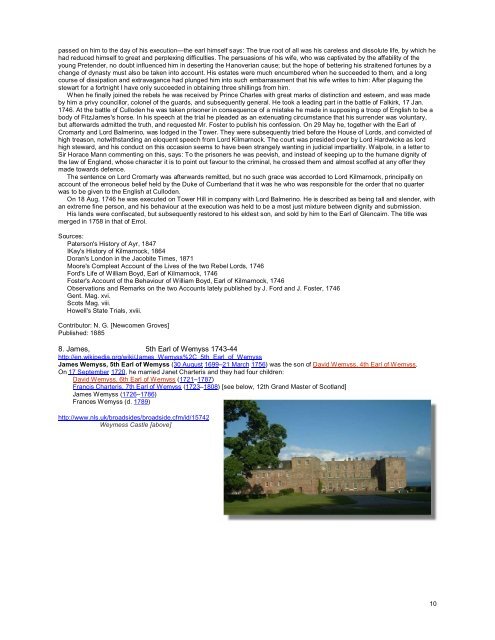Grand Masters of Scotland - Onondaga and Oswego Masonic ...
Grand Masters of Scotland - Onondaga and Oswego Masonic ...
Grand Masters of Scotland - Onondaga and Oswego Masonic ...
You also want an ePaper? Increase the reach of your titles
YUMPU automatically turns print PDFs into web optimized ePapers that Google loves.
passed on him to the day <strong>of</strong> his execution—the earl himself says: The true root <strong>of</strong> all was his careless <strong>and</strong> dissolute life, by which he<br />
had reduced himself to great <strong>and</strong> perplexing difficulties. The persuasions <strong>of</strong> his wife, who was captivated by the affability <strong>of</strong> the<br />
young Pretender, no doubt influenced him in deserting the Hanoverian cause; but the hope <strong>of</strong> bettering his straitened fortunes by a<br />
change <strong>of</strong> dynasty must also be taken into account. His estates were much encumbered when he succeeded to them, <strong>and</strong> a long<br />
course <strong>of</strong> dissipation <strong>and</strong> extravagance had plunged him into such embarrassment that his wife writes to him: After plaguing the<br />
stewart for a fortnight I have only succeeded in obtaining three shillings from him.<br />
When he finally joined the rebels he was received by Prince Charles with great marks <strong>of</strong> distinction <strong>and</strong> esteem, <strong>and</strong> was made<br />
by him a privy councillor, colonel <strong>of</strong> the guards, <strong>and</strong> subsequently general. He took a leading part in the battle <strong>of</strong> Falkirk, 17 Jan.<br />
1746. At the battle <strong>of</strong> Culloden he was taken prisoner in consequence <strong>of</strong> a mistake he made in supposing a troop <strong>of</strong> English to be a<br />
body <strong>of</strong> FitzJames's horse. In his speech at the trial he pleaded as an extenuating circumstance that his surrender was voluntary,<br />
but afterwards admitted the truth, <strong>and</strong> requested Mr. Foster to publish his confession. On 29 May he, together with the Earl <strong>of</strong><br />
Cromarty <strong>and</strong> Lord Balmerino, was lodged in the Tower. They were subsequently tried before the House <strong>of</strong> Lords, <strong>and</strong> convicted <strong>of</strong><br />
high treason, notwithst<strong>and</strong>ing an eloquent speech from Lord Kilmarnock. The court was presided over by Lord Hardwicke as lord<br />
high steward, <strong>and</strong> his conduct on this occasion seems to have been strangely wanting in judicial impartiality. Walpole, in a letter to<br />
Sir Horace Mann commenting on this, says: To the prisoners he was peevish, <strong>and</strong> instead <strong>of</strong> keeping up to the humane dignity <strong>of</strong><br />
the law <strong>of</strong> Engl<strong>and</strong>, whose character it is to point out favour to the criminal, he crossed them <strong>and</strong> almost sc<strong>of</strong>fed at any <strong>of</strong>fer they<br />
made towards defence.<br />
The sentence on Lord Cromarty was afterwards remitted, but no such grace was accorded to Lord Kilmarnock, principally on<br />
account <strong>of</strong> the erroneous belief held by the Duke <strong>of</strong> Cumberl<strong>and</strong> that it was he who was responsible for the order that no quarter<br />
was to be given to the English at Culloden.<br />
On 18 Aug. 1746 he was executed on Tower Hill in company with Lord Balmerino. He is described as being tall <strong>and</strong> slender, with<br />
an extreme fine person, <strong>and</strong> his behaviour at the execution was held to be a most just mixture between dignity <strong>and</strong> submission.<br />
His l<strong>and</strong>s were confiscated, but subsequently restored to his eldest son, <strong>and</strong> sold by him to the Earl <strong>of</strong> Glencairn. The title was<br />
merged in 1758 in that <strong>of</strong> Errol.<br />
Sources:<br />
Paterson's History <strong>of</strong> Ayr, 1847<br />
IKay's History <strong>of</strong> Kilmarnock, 1864<br />
Doran's London in the Jacobite Times, 1871<br />
Moore's Compleat Account <strong>of</strong> the Lives <strong>of</strong> the two Rebel Lords, 1746<br />
Ford's Life <strong>of</strong> William Boyd, Earl <strong>of</strong> Kilmarnock, 1746<br />
Foster's Account <strong>of</strong> the Behaviour <strong>of</strong> William Boyd, Earl <strong>of</strong> Kilmarnock, 1746<br />
Observations <strong>and</strong> Remarks on the two Accounts lately published by J. Ford <strong>and</strong> J. Foster, 1746<br />
Gent. Mag. xvi.<br />
Scots Mag. viii.<br />
Howell's State Trials, xviii.<br />
Contributor: N. G. [Newcomen Groves]<br />
Published: 1885<br />
8. James, 5th Earl <strong>of</strong> Wemyss 1743-44<br />
http://en.wikipedia.org/wiki/James_Wemyss%2C_5th_Earl_<strong>of</strong>_Wemyss<br />
James Wemyss, 5th Earl <strong>of</strong> Wemyss (30 August 1699–21 March 1756) was the son <strong>of</strong> David Wemyss, 4th Earl <strong>of</strong> Wemyss.<br />
On 17 September 1720, he married Janet Charteris <strong>and</strong> they had four children:<br />
David Wemyss, 6th Earl <strong>of</strong> Wemyss (1721–1787)<br />
Francis Charteris, 7th Earl <strong>of</strong> Wemyss (1723–1808) [see below, 12th <strong>Gr<strong>and</strong></strong> Master <strong>of</strong> <strong>Scotl<strong>and</strong></strong>]<br />
James Wemyss (1726–1786)<br />
Frances Wemyss (d. 1789)<br />
http://www.nls.uk/broadsides/broadside.cfm/id/15742<br />
Weymess Castle [above]<br />
10







![Richard [Nicholls] Harison / Harrison - Onondaga and Oswego ...](https://img.yumpu.com/24950065/1/190x245/richard-nicholls-harison-harrison-onondaga-and-oswego-.jpg?quality=85)

![Richard [Nicholls] Harison / Harrison - Onondaga and Oswego ...](https://img.yumpu.com/24950063/1/190x245/richard-nicholls-harison-harrison-onondaga-and-oswego-.jpg?quality=85)







